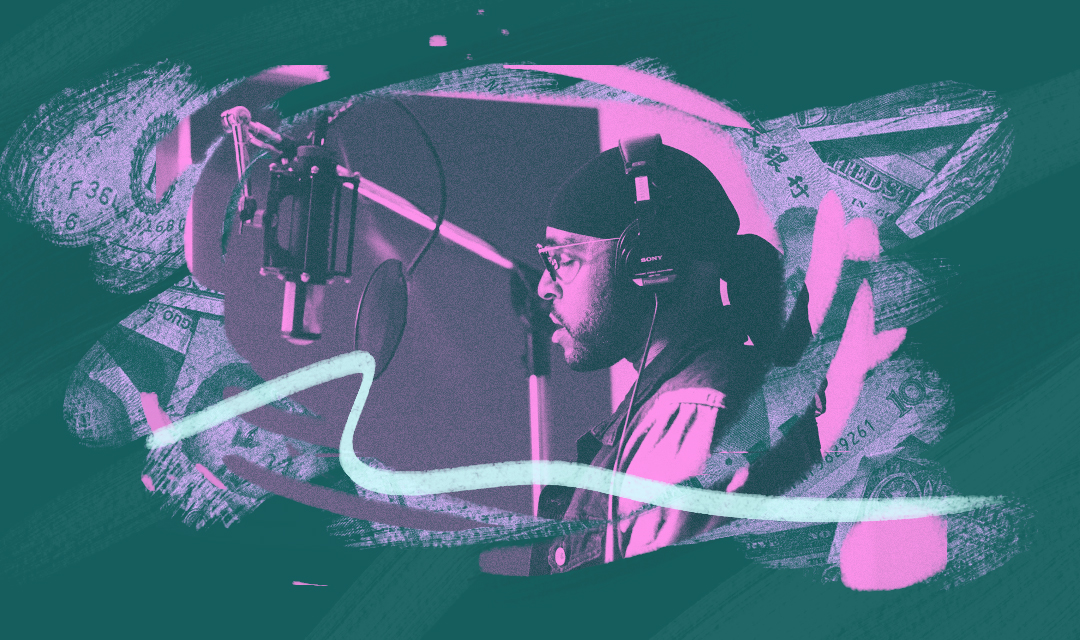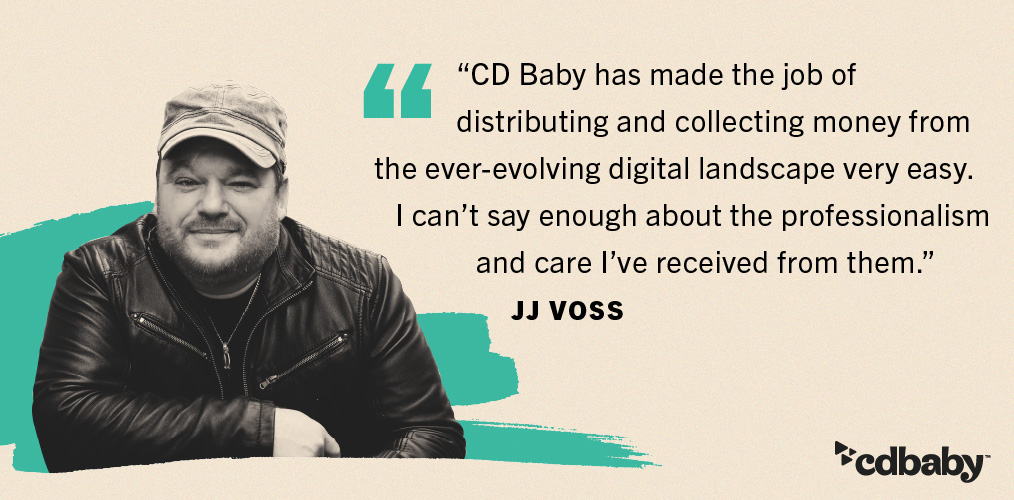
How do I earn royalties from my sound recordings?
Making money from your sound recording involves the exploitation of that sound recording’s copyright. But what is your copyright?
As we covered in our Copyright 101 article, copyright signifies the ownership of intellectual property by a person or group. In the case of a sound recording specifically, if you own that recording, you have control over what happens to it. In fact, you can make quite a bit of money from your recording(s). We’re here to tell you how.
What is a sound recording?
When you capture a composition in a medium that can be played back, that medium is the sound recording. In the music industry, this is also called the master, because it represents the final version of the song after it has been recorded, mixed and mastered. The master is the version of the song that is used for distribution. Most often these days, a master is an audio file saved to a computer, but some artists still opt for masters on tape.
In modern music, “sound recording” is interchangeable with the word “track.” This can be a confusing usage of the term, since “tracks” can also be used to describe the individual recorded takes of instruments and voices that are assembled to create the final mix.


Who owns my sound recordings?
Once your master is finished, you own that sound recording. The only exception to this is if you sell that recording to another entity or if another entity claims ownership of your recording through an agreement you signed. The most common example of this is record labels who stipulate their ownership of your masters in their contract in exchange for their funding the recording costs.
How do I copyright my sound recordings?
CD Baby can help you register your sound recording copyright through our partner Cosynd. Cosynd offers an easy method of registering your recording so you are legally covered in the event someone infringes on your copyright.
If you want to go the old fashioned way, you can also register your copyright directly with the U.S. Copyright Office with this form. Keep in mind the sound recording copyright is separate from the composition copyright for the songwriter(s), confusingly called a PA (performing artist) copyright. If you own the composition and the sound recording, you will need to register copyrights for each one.
What are the revenue sources for my recordings?
There are many sources through which your sound recordings can generate revenue:
Important note: Many of the usages of a sound recording listed below ALSO generate publishing royalties for the songwriter/publisher, but for the purposes of this article we’re just focusing on the royalties owed for the usage of a sound recording.
Streaming royalties
The most popular way for listeners to hear your music now is streaming. Through platforms like Spotify, Apple Music and YouTube Music, listeners can hear your music as much as they want without actually downloading the songs or owning them. Streaming platforms generate revenue by paid memberships and advertising; they then pay that revenue according to their determined streaming rate.
This varies from platform to platform, but generally the rate is a few tenths of a cent per stream. This sounds low, but the streaming platforms are in constant negotiations with organizations representing concerned parties in the music business to adjust the rates. And there are plenty of independent musicians who have been able to earn a living through streaming. Streaming’s ease of use means more people can hear your music, which in turn means more people are likely to see your show when you play live and/or buy merch.
Download revenue
Yes, people still download music! Reports of iTunes’ death have been greatly exaggerated. Personally speaking, I always check out an artist first on a streaming service since I don’t have to buy the music to hear it. But once I hear an album I like, I find it on a download site and buy it. The artist gets more money for making something I enjoy than if I had continued streaming their music.
Downloads also provide a sense of ownership over an album that is becoming rarer each year in the ephemeral world of streams. I like downloads because many sites offer higher quality audio files when you purchase them than what the streaming platforms offer. And there’s more permanence to downloaded music. You don’t need an Internet connection to listen if the music is saved on a local drive, so you’re not dependent on bandwidth when you want to hear your favorite tunes.
Physical media sales
Even more than downloads, much has been made of the demise of physical media. CDs’ popularity and even the surge of vinyl sales in recent years have been said to be in sharp decline. But many people still buy music on physical formats. I see the warehouse here at CD Baby stocked with hundreds of thousands of CDs and LPs and a sizable staff pulling them for shipment every day.
Physical media offers even more ownership than downloads because the buyer has something they can actually hold. Whether it’s for that real tactile experience, the collectability of limited edition CDs and especially vinyl or the fact that album art looks better full-sized and in person, millions of physical copies of albums are sold each year. How much money these sales generate is dependent on the price set by the artist or label. As an independent artist with CD Baby, you get to set the price for your physical media if you decide to make copies and sell through us.
Neighboring rights / digital performance royalties
What the heck are neighboring rights royalties and how are they generated? This is one of the more confusing areas of the music industry.
In the U.S., neighboring rights royalties are generated by airplay on satellite radio like Sirius XM and Internet radio like Pandora. Think of neighboring rights as digital performance royalties; they’re royalties generated from a form of radio airplay but they’re for the recording instead of the composition and are therefore owed to the holder of the sound recording copyright.
So, who collects these royalties? In the U.S., there’s a company called SoundExchange who collects from satellite and Internet radio. If you’re being played on either of those formats, we suggest you join SoundExchange and register your songs to collect what you’re owed. For Pandora, SoundExchange collects royalties generated by non-interactive plays, like on their curated playlists. Interactive streams via Pandora’s Premium service generate streaming royalties like any other streaming service covered in the first section above. SoundExchange also has a reciprocal agreement with many of the neighboring rights agencies around the world to collect royalties from satellite and Internet radio internationally.
Outside the U.S., neighboring rights takes on a different meaning. The term refers to royalties that are owed to the performing artist when a song is played on terrestrial radio. The U.S. does not recognize these royalties, but other countries around the world do. So if your music is being played on radio outside the U.S., you could be owed money. The catch? Only recordings created outside the U.S. are eligible to collect neighboring rights royalties for terrestrial radio airplay. So if you live outside the U.S. and recorded your music in that country, we suggest you research the neighboring rights organization in your country and register your songs with them.
YouTube Content ID
YouTube views do not by themselves generate revenue. Money from YouTube is earned by advertising revenue, which in turn is generated by ad clicks. CD Baby’s YouTube service uses YouTube’s Content ID system, which is a program that recognizes the unique pattern of a sound recording to match that content to any videos that are uploaded to YouTube. When it finds a match, it places an ad on the video, and each click on the ad generates revenue.
Social media monetization
You know you can earn money if your songs are placed in videos on YouTube, but did you also know your songs generated revenue if they’re used inn Instagram or Facebook stories? CD Baby can distribute your music to Instagram and Facebook so users can select it to place in a story. When one of your recordings is used in this way, it earns revenue that we collect for you.
Sync licensing
When your music is placed in other media like a movie or TV show, it is “synced” to the visuals. The company who secures the placement pays an upfront fee to use that recording.
CD Baby can make your music eligible to be placed in media with our sync licensing program. In fact, just in the past year we’ve secured placements in numerous shows on Netflix, Hulu and cable television . When we place your music for synchronization, we negotiate the fee on your behalf. This is dependent on a few factors, including the amount of the song used and the budget of the project in which your song is being used.
Sample use
When another artist uses your recording in one of their songs, this is called “sampling.” Since you own the copyright on your recording, you can approve or deny this use. If you approve of the use of your song, you can negotiate the fee the interested party pays for the use. CD Baby fields inquiries quite often from artists who have heard a song by one of our artists and are interested in using it in their own song. We then inform our artist and provide the contact information of the inquiring artist.
Unlike a sync placement, CD Baby does not take a fee for the use of the sample because we do not take part in the negotiation. You own your recording copyright, so it is entirely your decision if you approve the use of your song.
Remixes
Like sampling, if another artist wants to remix your recording, they must secure permission from the copyright holder directly. That’s you! Remixes are tricky because they fall into sort of a grey area; they’re not quite covers, and they’re not quite samples. Someone else is taking your existing recording and re-imagining it for a different version of the song, changing enough to technically make it a new recording.
Through all the confusion, one thing is clear: when someone remixes one of your songs, you are owed money. As with a sample, you negotiate the fee since you hold the sound recording copyright.
Who collects the revenue earned for my sound recording?
You do!
CD Baby not only distributes your music, we also help you collect the sound recording revenue from:
- Streaming
- Downloads
- CD and vinyl sales
- YouTube Content ID
- Facebook/Instagram monetization
- Sync licensing
- SoundExchange royalties (We only collect the copyright owner’s half from SoundExchange, and only if that goes uncollected. We recommend you affiliate with SoundExchange as both an artist and a copyright owner to collect 100% of your royalties from them directly.)
After we take our respective fee from the revenue reported to us, the rest goes into your artist account balance. Not only do we make sure your music gets to all of the places you select, we also make sure you collect the money you’re owed. We’ve been paying artists WEEKLY since 1998, and we’re always looking for more ways you can earn money for your music.
Learn more about your various music revenue sources in this episode of the DIY Musician Podcast: